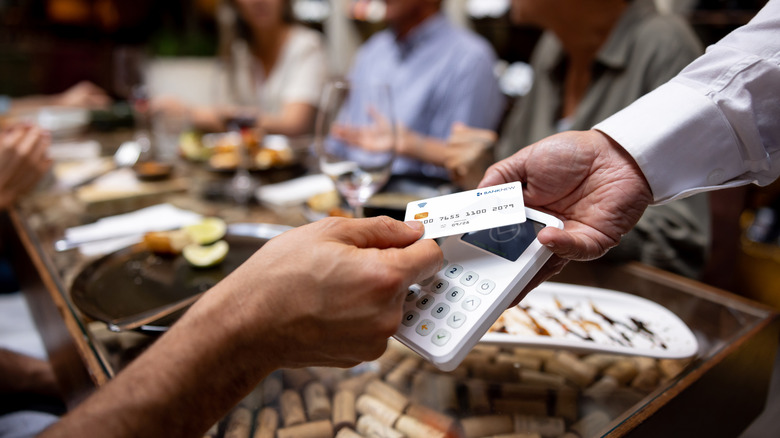New Jersey Restaurants Are Being Fined For Surprise Credit Card Fees
Even though much of the U.S. is going cashless, credit card processing fees remain, and they can add up to be a devastating hit to struggling restaurants with low profit margins. Still, inflation-weary consumers are struggling too. As New Jersey Senator Gordon Johnson put it, "[W]e understand these processing fees can be burdensome for businesses, but we also don't want them taking advantage of the situation," via NJ Spotlight News.
Surprise credit card fees are enough trouble on their own. These charges are imposed by banking companies on merchants every time a credit card is swiped, and during a 10-year span, they have gotten more than twice as high. In 2023, 15% of restaurant owners nationwide added surcharges to their regular bills, per the National Restaurant Association (via CNBC). The rates often fall between 3% and 5%. Passing the cost to customers might seem like the natural move, and it's legal. But, the key factor here is that restaurants have to inform their customers about who's fronting the swipe fee, and 16 New Jersey eateries are now facing hefty fines for failing to be transparent.
The New Jersey Division of Consumer Affairs spent over a full year tailing these businesses to catch their pattern of unlawful practices, and are now imposing penalty fees ranging from $500 up to $4,000. 12 restaurants were also sanctioned for refusing to accept cash payments.
Reinforcing an industry-wide policy of transparency
Informing customers about card-processing fees became a state law in New Jersey in August 2023. Restaurants are required to post "clear and conspicuous" notifications in customer waiting areas, at the point of entry, at the point of sale, and on the menus expressly informing consumers about the added swipe fee before they order their meal. That way, they can decide to hit an ATM or even dine elsewhere. Another (perhaps obvious) aspect of the law is that the swipe fee passed off on customers cannot be higher than what the restaurant would have paid if it had eaten the surcharge itself.
It becomes even tougher for many consumers to know where these surcharges are going with many states voting to phase out the tip credit. The cost burden also sucks for restaurant employees and other tipped servers, who don't have any control over the high surcharge amount (which could negatively hit the gratuities they receive for their hard work).
What started as a temporary life raft for businesses to stay afloat may become a permanent industry practice. But, the good news is that moving forward, these surcharges will likely be subjected to stricter regulations to protect consumers from being exploited. These 16 fined New Jersey restaurants could serve as an example and a warning to other businesses.

